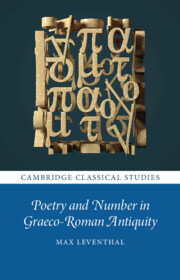Acknowledgements
This book has had a considerably long gestation and several origins. I first began thinking about the intersection of poetry and number as a Master’s student. The result was a dissertation on Archimedes’ Cattle Problem, and it would eventually become an article in Ramus (2015), which is substantially reworked and expanded here as Chapter 3. I then pursued a doctorate on a different topic. Still, Leonides of Alexandria and his isopsephic epigrams constituted one distraction from the main task of my thesis; in fact, some of the material of Chapter 2 had originally been submitted to the Cambridge Classical Journal as an article. I thank the anonymous reviewers of that piece for their challenging but supportive feedback. A failed Oxford interview in 2008 bears special mention, too, since it was there that I first encountered Catullus cc. 5 and 7 – and I have been ruminating on those poems ever since. The beginnings of a postdoctoral position afforded me the time to write up these ideas while, once again, I should have been working on other things. Thus, this book is quite a different beast to one’s typical first book in academia. It is the product of a lengthy obsession and not the direct result of my doctoral studies. Yet I hope and believe that the passage of so much time has imbued it with a certain intellectual maturity – of the kind which I did not yet possess as a fresh postgraduate – and has streamlined its arguments so as to avoid the bloatedness that is a residual characteristic of many a thesis turned monograph.
Although this is not the ‘book of the thesis’, I nevertheless owe a debt of gratitude to several supervisors and mentors, for the profound influence they have had on me as a scholar and as a person. Liba Taub supervised my Master’s thesis and has been a continual source of support. She frequently saw the value of my thinking before I did and encouraged me to pursue many lines of enquiry that are now to be found in this book. In that sense, it could not have been written without her. Renaud Gagné supervised my doctoral thesis, and I am indebted to his inexhaustible generosity, which has been truly formative. Richard Hunter, my second supervisor, has read over more drafts of my various musings than I can recall; he has vastly improved them all with his knack for asking just the right question to make one reflect on both matters of detail and the larger picture. Tim Whitmarsh served as the internal examiner of my thesis along with Annette Harder, who served as the external examiner: their feedback was as constructive as it was honest. I have been fortunate also to have Tim as my postdoctoral mentor; his kindness, support and advice on all manner of subjects have been a real inspiration.
It gives me great pleasure also to acknowledge those colleagues and friends whose efforts have improved this final product. As well as Richard Hunter and the anonymous reviewer at CCS, drafts of this entire book were read by Jan Kwapisz, Arthur Harris and Sam Oliver, who all brought their own expertise to bear in enhancing its clarity and avoiding any infelicities. Likewise, individual chapters were read over and sharpened by Simon Goldhill, Talitha Kearey, Thomas Nelson, Floris Overduin and Ivana Petrovic. The Introduction in particular benefited from being exposed to the exacting eyes of the Postdoctoral Work in Progress Seminar (PWiPS) in Cambridge. I would also like to thank Francesco Grillo, Richard Hunter and Jan Kwapisz, who all shared their unpublished work with me.
I was lucky enough to receive funding as a postgraduate student from Corpus Christi College, Cambridge, the Faculty of Classics, University of Cambridge and the Jebb Fund. I was even more fortunate subsequently to be awarded a Research Fellowship at Trinity Hall, Cambridge and a British Academy Postdoctoral Fellowship at the Faculty of Classics. These institutions have provided me with the time, space and (relative) job security with which to pursue several projects, including this present book.
Cambridge has been a truly wonderful place to grow intellectually, and this is down to its enriching and lively community. If sometimes I have felt the weight of academia as a solitary endeavour pulling me under, it has been the friendship of Talitha Kearey, Thomas Nelson and, above all, of Hannah Price that has buoyed me up. I owe them so much. Of course, there is more to life than books (but not much more), and I want also to thank those friends outside academia who have kept me sane and have brought me great joy beyond the job: Sam Isaacs, Dan Keane, Raj Mistry, Joe Smallman, Sam Oliver and Hannah Price (again!).
The most personal debts, though, I cannot ever hope to repay. For their love, I am forever grateful to my parents, Sue, Michael, Ross and Kirsteen, to my siblings Rebecca, William and Robbie, and to my grandparents, Peter, Mary and Pam. But the deepest thanks go to my partner, Alex, whose incalculable love, support and immeasurable patience – when it comes to academic tribulations and more besides – have kept me going now for a full decade (but who’s counting?).



